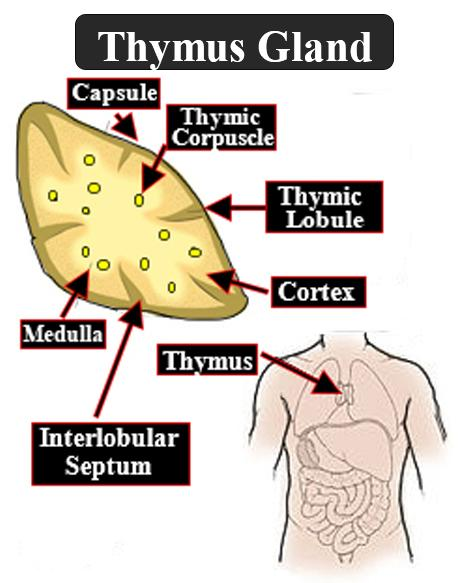
List the hormones secreted by the thymus
Answer
590.4k+ views
Hint: Thymus is a soft, pinkish, bilobed mass of lymphoid tissue present just above the heart. It is formed of an outer cortex and central medulla. The thymus is large-sized and active in the young child and grows to the maximum size at puberty and then degrades gradually.
Complete answer:
The thymus secretes one or more stimulatory factors, collectively called thymic hormones. The most important being the Thymosin hormone.
Additional Information:
-Functions of the thymus gland:
1. It also has Hassall’s corpuscles which act as phagocytes.
2. It increases the rate of cell division so controls the rate of growth during early life.
3. It increases the production of the antibodies from B-lymphocytes so provides humoral immunity.
-The discovery of Thymosin took place in the mid 1960s from investigations of the role of the thymus in the development of the vertebrate immune system.
-T-cells are very important in case of adaptive immune response, where the body adapts specifically to foreign invaders.
-Nowadays, the Thymosin hormone is used in hair loss treatment.
-The thymus is made up of immature T-cells called thymocytes, and epithelial cell lining, which help the thymocytes develop.
-Any internal damage to the thymus gland can bring about a decrease in the number of T cells and lead to autoimmune diseases such as Autoimmune polyendocrine syndrome type 1 and myasthenia gravis.

Note: The Thymus gland is also known as ‘Throne of immunity’ or ‘training schools of T-lymphocytes.’ The thymus is the site of differentiation of the t-lymphocytes of the immune system. Thymosin increases the activity of the T-lymphocytes which provide cell-mediated immunity.
Complete answer:
The thymus secretes one or more stimulatory factors, collectively called thymic hormones. The most important being the Thymosin hormone.
Additional Information:
-Functions of the thymus gland:
1. It also has Hassall’s corpuscles which act as phagocytes.
2. It increases the rate of cell division so controls the rate of growth during early life.
3. It increases the production of the antibodies from B-lymphocytes so provides humoral immunity.
-The discovery of Thymosin took place in the mid 1960s from investigations of the role of the thymus in the development of the vertebrate immune system.
-T-cells are very important in case of adaptive immune response, where the body adapts specifically to foreign invaders.
-Nowadays, the Thymosin hormone is used in hair loss treatment.
-The thymus is made up of immature T-cells called thymocytes, and epithelial cell lining, which help the thymocytes develop.
-Any internal damage to the thymus gland can bring about a decrease in the number of T cells and lead to autoimmune diseases such as Autoimmune polyendocrine syndrome type 1 and myasthenia gravis.

Note: The Thymus gland is also known as ‘Throne of immunity’ or ‘training schools of T-lymphocytes.’ The thymus is the site of differentiation of the t-lymphocytes of the immune system. Thymosin increases the activity of the T-lymphocytes which provide cell-mediated immunity.
Recently Updated Pages
Master Class 11 Computer Science: Engaging Questions & Answers for Success

Master Class 11 Business Studies: Engaging Questions & Answers for Success

Master Class 11 Economics: Engaging Questions & Answers for Success

Master Class 11 English: Engaging Questions & Answers for Success

Master Class 11 Maths: Engaging Questions & Answers for Success

Master Class 11 Biology: Engaging Questions & Answers for Success

Trending doubts
One Metric ton is equal to kg A 10000 B 1000 C 100 class 11 physics CBSE

There are 720 permutations of the digits 1 2 3 4 5 class 11 maths CBSE

Discuss the various forms of bacteria class 11 biology CBSE

Draw a diagram of a plant cell and label at least eight class 11 biology CBSE

State the laws of reflection of light

10 examples of friction in our daily life




